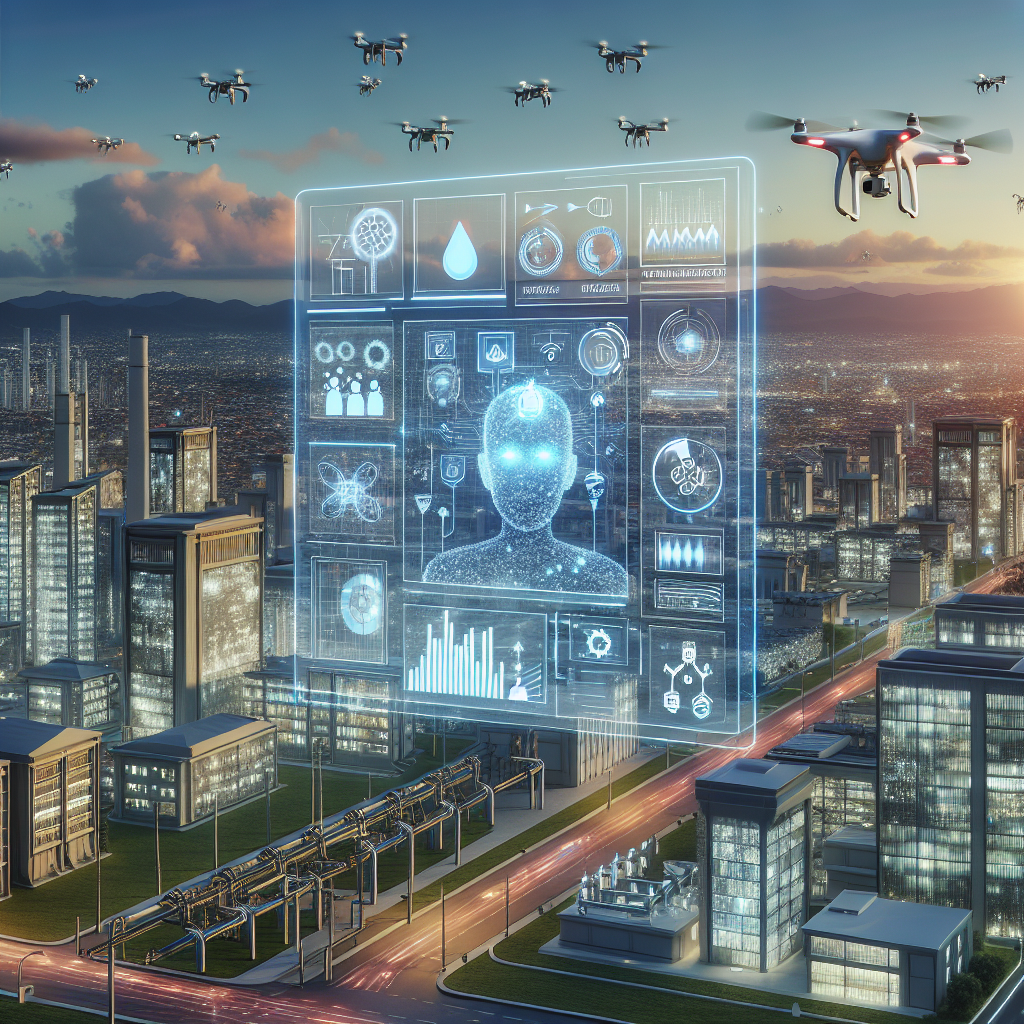The Use of AI in Public Utilities Management and Operations
Public utilities are essential services that play a critical role in our everyday lives. These services include water, electricity, gas, and waste management, among others. The efficient management and operation of public utilities are crucial to ensuring that these services are delivered reliably and effectively to the public. With the advancements in technology, particularly in the field of artificial intelligence (AI), public utilities are increasingly turning to AI to improve their management and operations.
AI refers to the simulation of human intelligence in machines that are programmed to think and act like humans. This technology has the potential to revolutionize the way public utilities are managed and operated, making them more efficient, reliable, and cost-effective. In this article, we will explore the use of AI in public utilities management and operations and examine the benefits and challenges associated with its implementation.
Benefits of AI in Public Utilities Management and Operations
1. Predictive Maintenance: One of the key benefits of AI in public utilities management is its ability to predict and prevent equipment failures before they occur. By analyzing data from sensors and other sources, AI can identify patterns and anomalies that may indicate potential issues with equipment. This allows utilities to schedule maintenance proactively, reducing downtime and avoiding costly repairs.
2. Energy Optimization: AI can help public utilities optimize their energy consumption by analyzing data in real-time and adjusting operations accordingly. For example, AI can optimize the distribution of electricity to minimize waste and reduce costs. This not only helps utilities save money but also reduces their carbon footprint and contributes to a more sustainable energy system.
3. Customer Service: AI-powered chatbots and virtual assistants can be used to improve customer service in public utilities. These tools can provide instant responses to customer inquiries, streamline billing processes, and even offer personalized energy-saving tips. By leveraging AI, utilities can enhance the overall customer experience and build stronger relationships with their customers.
4. Asset Management: AI can be used to track and manage the assets of public utilities more efficiently. By analyzing data on equipment performance and maintenance history, AI can help utilities make informed decisions about asset replacement, repair, and upgrades. This can extend the lifespan of assets, reduce downtime, and optimize capital investments.
Challenges of AI in Public Utilities Management and Operations
1. Data Privacy and Security: As public utilities collect and analyze large amounts of data, concerns about data privacy and security become more prominent. Utilities must ensure that sensitive customer information is protected and that AI systems are secure from cyber threats. Implementing robust data protection measures and compliance with regulations such as GDPR is essential to address these challenges.
2. Workforce Training: The implementation of AI in public utilities requires a skilled workforce that can develop, deploy, and maintain AI systems. Utilities need to invest in training programs to upskill their employees and ensure they are equipped to work alongside AI technologies effectively. This can be a significant challenge, especially for utilities with limited resources or a workforce that is resistant to change.
3. Integration with Legacy Systems: Many public utilities rely on legacy systems that may not be compatible with AI technologies. Integrating AI into existing infrastructure can be complex and time-consuming, requiring utilities to invest in upgrades and modifications to ensure seamless integration. Utilities need to carefully plan and execute their AI implementation strategy to avoid disruption to their operations.
4. Regulatory Compliance: Public utilities are subject to strict regulations and compliance requirements that govern their operations. The use of AI can introduce new regulatory challenges, such as ensuring transparency and accountability in AI decision-making processes. Utilities must navigate these regulatory hurdles to ensure that their AI systems comply with industry standards and regulations.
FAQs
Q: How can AI improve the reliability of public utilities?
A: AI can improve the reliability of public utilities by enabling predictive maintenance, optimizing energy consumption, and enhancing asset management. By analyzing data in real-time, AI can identify potential issues before they occur, allowing utilities to take proactive measures to prevent downtime and ensure reliable service delivery.
Q: How can AI benefit customers of public utilities?
A: AI can benefit customers of public utilities by improving customer service, offering personalized energy-saving tips, and enhancing the overall customer experience. AI-powered chatbots and virtual assistants can provide instant responses to customer inquiries, streamline billing processes, and offer tailored recommendations to help customers save energy and reduce costs.
Q: What are some of the challenges associated with implementing AI in public utilities?
A: Some of the challenges associated with implementing AI in public utilities include data privacy and security concerns, the need for workforce training, integration with legacy systems, and regulatory compliance requirements. Utilities must address these challenges to ensure the successful deployment of AI technologies in their operations.
Q: How can public utilities overcome the challenges of implementing AI?
A: Public utilities can overcome the challenges of implementing AI by investing in data protection measures, providing workforce training programs, upgrading legacy systems, and ensuring compliance with regulatory requirements. By carefully planning and executing their AI implementation strategy, utilities can maximize the benefits of AI in their operations.
In conclusion, the use of AI in public utilities management and operations offers significant benefits in terms of improving reliability, optimizing energy consumption, enhancing customer service, and managing assets more efficiently. While there are challenges associated with the implementation of AI, utilities can overcome these challenges by addressing data privacy and security concerns, investing in workforce training, upgrading legacy systems, and ensuring regulatory compliance. By leveraging AI technologies effectively, public utilities can enhance their operations, deliver better services to customers, and contribute to a more sustainable and resilient infrastructure.

